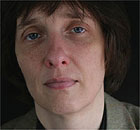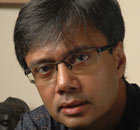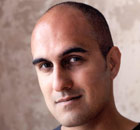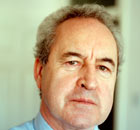Publetariat’s series on the psychology of writing continues with this piece, which originally appeared on The Guardian UK site on 3/3/09.
Colm Tóibín claims he does not enjoy writing very much. Do other authors share his view?
AL Kennedy

The joy of writing for a living is that you get to do it all the time. The misery is that you have to, whether you’re in the mood or not. I wouldn’t be the first writer to point out that doing something so deeply personal does become less jolly when you have to keep on at it, day after cash-generating day. To use a not ridiculous analogy: Sex = nice thing. Sex For Cash = probably less fun, perhaps morally uncomfy and psychologically unwise. Sitting alone in a room for hours while essentially talking in your head about people you made up earlier and then writing it down for no one you know does have many aspects which are not inherently fulfilling. Then again, making something out of nothing, overturning the laws of time and space, building something for strangers just because you think they might like it and hours of absence from self – that’s fantastic. And then it’s over, which is even better. I’m with RLStevenson – having written – that’s the good bit.
Amit Chaudhuri

Writing novels is no fun; nor is, generally speaking, reading novels. Reading people writing about novels is not always fun, either, because relatively little of this kind of writing is any good. Then there’s the group of people who don’t enjoy being novelists, to which I probably belong; whose lives are at once shaped and defined by, and to some extent entrapped in, the act of writing fiction. I still find it difficult to believe that I’m something called a ‘novelist’; but this hasn’t stopped me from dreaming, frequently, of alternative professions: second-hand bookshop owner; corporate worker; cinematographer. There are many reasons for this unease. One of them is a fundamental discomfort with narrative itself, and involves admitting to yourself that you derive your basic pleasure not from knowing what happens next, but from arrested time or eventlessness; this makes you constantly wish, as you’re writing, that you were elsewhere, or it makes you work to make the novel accommodate that impulse. Another reason is the professionalisation of the vocation, so that the novelist is supposed to produce novels as naturally, automatically, and regularly as a cow gives milk. In such a constraining situation, money can certainly be a compensatory pleasure; so can that paradoxical and sly addiction, failure.
Hari Kunzru

I get great pleasure from writing, but not always, or even usually. Writing a novel is largely an exercise in psychological discipline – trying to balance your project on your chin while negotiating a minefield of depression and freak-out. Beginning is daunting; being in the middle makes you feel like Sisyphus; ending sometimes comes with the disappointment that this finite collection of words is all that remains of your infinitely rich idea. Along the way, there are the pitfalls of self-disgust, boredom, disorientation and a lingering sense of inadequacy, occasionally alternating with episodes of hysterical self-congratulation as you fleetingly believe you’ve nailed that particular sentence and are surely destined to join the ranks of the immortals, only to be confronted the next morning with an appalling farrago of clichés that no sane human could read without vomiting. But when you’re in the zone, spinning words like plates, there’s a deep sense of satisfaction and, yes, enjoyment…
John Banville

Civilisation’s greatest single invention is the sentence. In it, we can say anything. That saying, however, is difficult and peculiarly painful. Whether we are writing a novel or a letter to our bank manager, we have the eerie sensation that we are not so much writing as being written, that language in its insidious way is using us as a medium of expression and not vice versa. The struggle of writing is fraught with a specialised form of anguish, the anguish of knowing one will never get it right, that one will always fail, and that all one can hope to do is ‘fail better’, as Beckett recommends. The pleasure of writing is in the preparation, not the execution, and certainly not in the thing executed. The novelist daily at his desk eats ashes, and if occasionally he encounters a diamond he is likely to break a tooth on it. Money is necessary to pay the dentist’s bills.
Will Self

I gain nothing but pleasure from writing fiction; short stories are foreplay, novellas are heavy petting – but novels are the full monte. Frankly, if I didn’t enjoy writing novels I wouldn’t do it – the world hardly needs any more and I can think of numerous more useful things someone with my skills could be engaged in. As it is, the immersion in parallel but believable worlds satisfies all my demands for vicarious experience, voyeurism and philosophic calithenics. I even enjoy the mechanics of writing, the dull timpani of the typewriter keys, the making of notes – many notes – and most seducttive of all: the buying of stationery. That the transmogrification of my beautiful thoughts into a grossly imperfect prose is always the end result doesn’t faze me: all novels are only a version- there is no Platonic ideal. But I’d go further still: fiction is my way of thinking about and relating to the world; if I don’t write I’m not engaged in any praxis, and lose all purchase.
Read the rest of the piece, which includes responses from Joyce Carol Oates, Geoff Dyer, Ronan Bennett and Julie Myerson, on The Guardian UK site.
